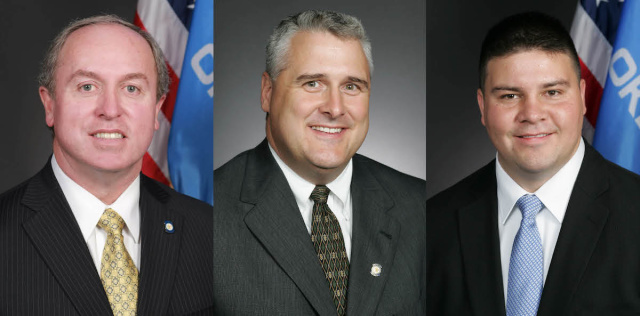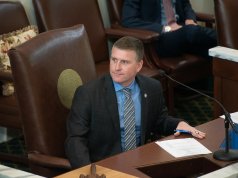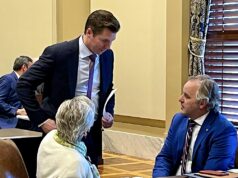
(Update: eCapitol.net’s Shawn Ashley reports that Sen. Mike Schulz (R-Altus) as the Oklahoma Senate’s next president pro tempore.)
Republican members of the Oklahoma Senate will gather this afternoon in Room 535 of the State Capitol to select a successor to President Pro Tempore Brian Bingman — the leader of the Legislature’s upper chamber.
Bingman (R-Sapulpa) will be term-limited out of office this year, having held the Pro Temp position for the past six years after former Sen. Glenn Coffee was forced out via term limits.
Multiple conversations with Republican senators helped paint a picture for NonDoc of how today’s proceedings — and what is at stake — might unfold. Senators, however, asked not to speak on the record or even be quoted anonymously, so the following information and analysis comes from combined conversations.
The process and players
The selection of the State Senate’s leader is held in private by the controlling party — in this instance, the GOP. Republicans control 39 of 48 seats in the chamber, and a Pro Temp candidate must receive 51 percent of the votes. In this instance, 20 will do it.
Those wishing to seek the position had to have notified the caucus by Friday, and three men did: Sen. Mike Schulz (R-Altus), Sen. Ralph Shortey (R-OKC) and Sen. Marty Quinn (R-Claremore).
Sen. Schulz is the existing Senate floor leader, a leadership position that can inherently lend itself to a Pro Temp promotion. By all accounts, the gravely voiced Schulz is favored to win the caucus vote, which is conducted by secret ballot.
Some seek different leadership
But Shortey’s and Quinn’s candidacies highlight concerns among some caucus members that existing Senate leadership has failed to articulate a mission for the state.
Two members expressed specific worry that the Senate GOP caucus did not present a public agenda this year beyond crafting a budget agreement. Bingman has long been viewed by Capitol insiders as somewhat of a get-along guy who leads quietly, and Schulz has been a strong supporter of the Sapulpa Republican’s leadership term.
Shortey, who announced his desire for the post before Quinn, is expected to draw support from the caucus’ farther-right members. Quinn, a first-term senator with an insurance background, might draw support from moderate members who question Schulz’s ability to be a stronger Pro Temp than Bingman or his strong allegiance to the Oklahoma Farm Bureau.
Similarly, there is rumbling that OKC and Tulsa interests may prefer a Pro Temp with ties to one of the state’s largest municipalities, especially on issues like water rights. But some senators noted that the Senate GOP makeup remains largely rural, which should benefit Schulz.
As for the cotton farmer from Altus, Schulz will be termed out himself in 2018, meaning his potential Pro Temp term would only be two years. Some senators suggested that they and their colleagues are inclined not to oppose Schulz outright, instead staking out allegiances for future caucus votes.
They suggested that, if Schulz is elected, the caucus campaign for the next Pro Temp post would begin almost immediately.
To be a fly on the wall today, right?




















